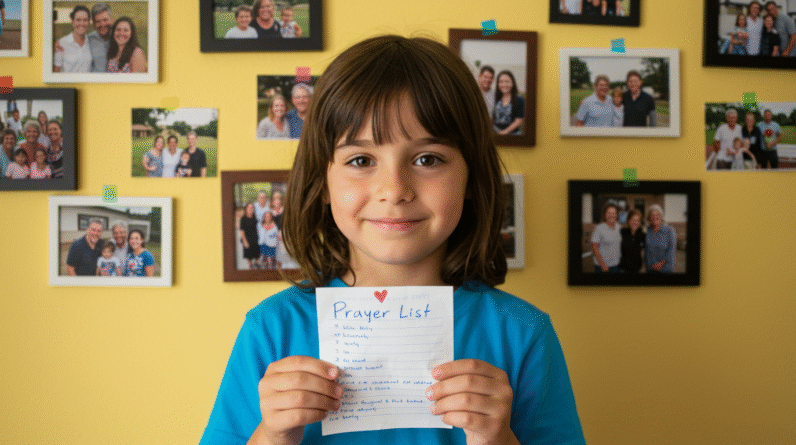How to Teach Your Kids to Love God: Faith-Filled Parenting Tips
Navigating the world of parenting is a journey filled with countless joys and challenges. As a parent who wants to instill a deep and enduring love for God in your child’s heart, you might wonder about the best path to take. Teaching kids to love God isn’t about forcing faith upon them but gently guiding them towards a heartfelt relationship with the Divine. In a world pulling them in countless directions, offering a solid, faith-filled foundation can give them the anchor they need. In this article, we’ll explore practical and spiritual parenting strategies to cultivate a Christ-centered home that inspires your children to naturally develop and embrace their love for God.
Creating a Christ-Centered Environment
Creating a Christ-centered environment in your home is foundational in teaching your kids to love God. Your home should serve as a nurturing ground for spiritual growth and learning. It’s about integrating faith into everyday life and using the home as a canvas to paint the picture of God’s love and mercy.
To create such an environment, you can start by making simple changes like displaying scripture-based art, playing worship music, or encouraging prayer before meals. Here, the goal is to let God’s presence be felt in various aspects of your home life. Remember, it’s the little things that consistently reinforce the greater picture of faith.
Lead by Example: Your Actions Speak Louder Than Words
One of the most powerful tools you have as a parent is your example. Children are incredibly observant, and they learn a lot more about what you do than what you say. Demonstrate your love for God in your daily actions, be it through kindness, patience, or forgiveness.
When you experience your faith firsthand, your children witness genuine devotion and a lifestyle of worship. Allow them to see you turn to God in moments of decision, joy, and even struggle. This visible faith provides them with a model to follow and shows them that loving God is a natural and integral part of life.
Encourage Open Discussion About Faith
Encouraging open discussions about faith is crucial in helping teach kids to love God. Children should feel comfortable asking questions and expressing doubts. Create a safe space for them to explore their beliefs without judgment.
By engaging them in conversations about the stories and teachings of the Bible, you make faith accessible and relatable. Consider asking open-ended questions during family devotionals or after a Sunday service. Invite their input, thoughts, and reflections. This practice not only strengthens their understanding but also allows them to see faith as a conversation rather than a doctrine.
Incorporate Daily Devotions and Prayer
Daily devotions and prayer can weave faith into the fabric of your family’s routine. These moments offer a way to connect with God regularly and model spiritual discipline.
Begin and end the day with prayer, thanking God for His blessings and seeking His guidance. Short family devotions centered around a specific verse, such as Proverbs 22:6, “Start children off on the way they should go, and even when they are old they will not turn from it,” can spark reflection and conversation.
Remember, teaching kids to love God through daily devotions doesn’t have to be lengthy or complex. Even a few minutes spent together in God’s Word can leave a lasting impact.

Introduce Bible Stories and Characters
Bible stories are a rich resource for teaching kids about God’s love and fostering a personal connection to Him. Introducing these narratives gives children a sense of history and belonging within a larger spiritual family.
Make storytelling a regular part of your family’s faith life. Characters like David, Daniel, and Esther offer profound lessons on courage, faith, and resilience. Use these stories to discuss God’s nature, His promises, and His involvement in our lives. Reference examples like David and Goliath to illustrate God’s power, or Daniel in the lions’ den to show His protection.
Encourage Participation in Church and Community
Church involvement is an excellent way to teach kids to love God, as it extends their faith experience beyond the home. Through participation in church services, Sunday school, and community activities, children see faith in action at a broader level.
Encourage your children to partake in various church events, such as youth groups, mission projects, or choir practices. These activities provide them with opportunities to form connections with peers and mentors who share their religious values. Witnessing other people their age living out their faith serves as inspiration and reassurance that they’re not alone in their spiritual journey.
Foster a Spirit of Gratitude and Service
Instilling gratitude and a spirit of service is a powerful way to teach kids to love God. By doing so, you demonstrate that love for God naturally translates into love and kindness towards others.
Engage your family in service projects or volunteer opportunities, such as visiting a local shelter or helping out at a food drive. Discuss biblical teachings on serving others, like the encouragement to love your neighbor found in Mark 12:31, “Love your neighbor as yourself.” Through these experiences, children learn to see the world through a lens of compassion and selflessness, core tenets of a life devoted to God.
Embrace Diversity and Different Perspectives
In today’s interconnected world, teaching your kids to love God also means preparing them to engage with diverse beliefs and ideas. Encourage your children to learn about different cultures and religious practices to foster empathy and understanding.
Use this exposure to reflect on your faith and explore how different perspectives can enrich and broaden your understanding of God’s love. Have open discussions about respect and tolerance, emphasizing that love for God encompasses love for all His creation, irrespective of differences.
Encourage Creativity and Expression in Faith
Encouraging creativity and personal expression can make faith feel more personal and accessible to your children. Whether through art, music, writing, or dance, allow them to explore their spirituality in creative ways that resonate with their passions and interests.
Consider setting up a creative corner in your home where they can express their faith through drawing scripture, writing reflections, or playing faith-based music. This approach emphasizes that a relationship with God can be both unique and deeply personal, helping them to develop their own love for God.
Teach Forgiveness and Understanding
Teaching kids to love God includes nurturing values like forgiveness and understanding. As they grow, children will inevitably face conflicts or misunderstandings, and these are prime opportunities to show them God’s way of resolving issues.
Show them biblical examples, such as Jesus’ teaching on forgiveness, where Peter asks how many times he should forgive someone, and Jesus answers, not seven times, but seventy times seven. Teach them that loving God means striving for peace and extending grace to others, just as God extends His grace to us.
Nurture a Strong Sense of Identity and Purpose
Helping your kids develop a strong sense of identity and purpose through their faith is pivotal in teaching them to love God. Encourage them to see themselves as individuals with unique gifts and missions given by God.
Link their interests and talents to service in their community or church, offering them a sense of purpose aligned with their faith. By intertwining personal identity with divine calling, you’ll inspire your children to live meaningful lives rooted in their love for God.
Conclusion
Teaching kids to love God is a deeply rewarding aspect of faith-filled parenting. By creating a nurturing environment, leading by example, encouraging open discussions, and involving your children in both personal and communal faith activities, you can instill in them a genuine and lasting love for God. These practical and spiritual strategies are not only beneficial for their spiritual development but also enrich the familial bond with a shared sense of faith and devotion.
Explore More
For further reading and encouragement, check out these posts:
👉 7 Bible Verses About Faith in Hard Times
👉 Job’s Faith: What We Can Learn From His Trials
👉 How To Trust God When Everything Falls Apart
👉 Why God Allows Suffering – A Biblical Perspective
👉 Faith Over Fear: How To Stand Strong In Uncertain Seasons
👉 How To Encourage Someone Struggling With Their Faith
👉 5 Prayers for Strength When You’re Feeling Weak

📘 Jesus and the Woman Caught in Adultery – Grace and Mercy Over Judgement
A powerful retelling of John 8:1-11. This book brings to life the depth of forgiveness, mercy, and God’s unwavering love.
👉 Check it now on Amazon
As a ClickBank Affiliate, I earn from qualifying purchases.
Acknowledgment: All Bible verses referenced in this article were accessed via Bible Gateway (or Bible Hub).
“Want to explore more? Check out our latest post on Why Jesus? and discover the life-changing truth of the Gospel!”








